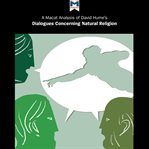Nonfiction
eAudiobook
Details
PUBLISHED
Made available through hoopla
EDITION
DESCRIPTION
1 online resource (1 audio file (1hr., 53 min.)) : digital
ISBN/ISSN
LANGUAGE
NOTES
Read by Macat.com
David Hume's book tackling the subject of belief in God is among the most influential in Western philosophy. Published in 1779, three years after Hume's death, without featuring the author's name, the book was deeply controversial in its day. It is now considered a masterpiece and Hume is regarded as one of the greatest philosophers writing in English. A cleverly crafted fictional conversation, Dialogues deals with justifying belief in God. On the one hand is the argument that a universe that looks designed must have a designer, and also the argument that the universe has what is known as an uncaused first cause, and that can only be God. On the other hand is the argument that if there is evil in the world, then there cannot be a God. Through these debates Hume weaves the question of whether we can truly know God's nature. Dialogues is an elegant exploration of Hume's empiricism, the theory that knowledge can only be built on what we experience through our senses. More than 200 years after the work was first published, Hume's beautifully shaped arguments are still in use among twenty-first-century philosophers
Mode of access: World Wide Web







